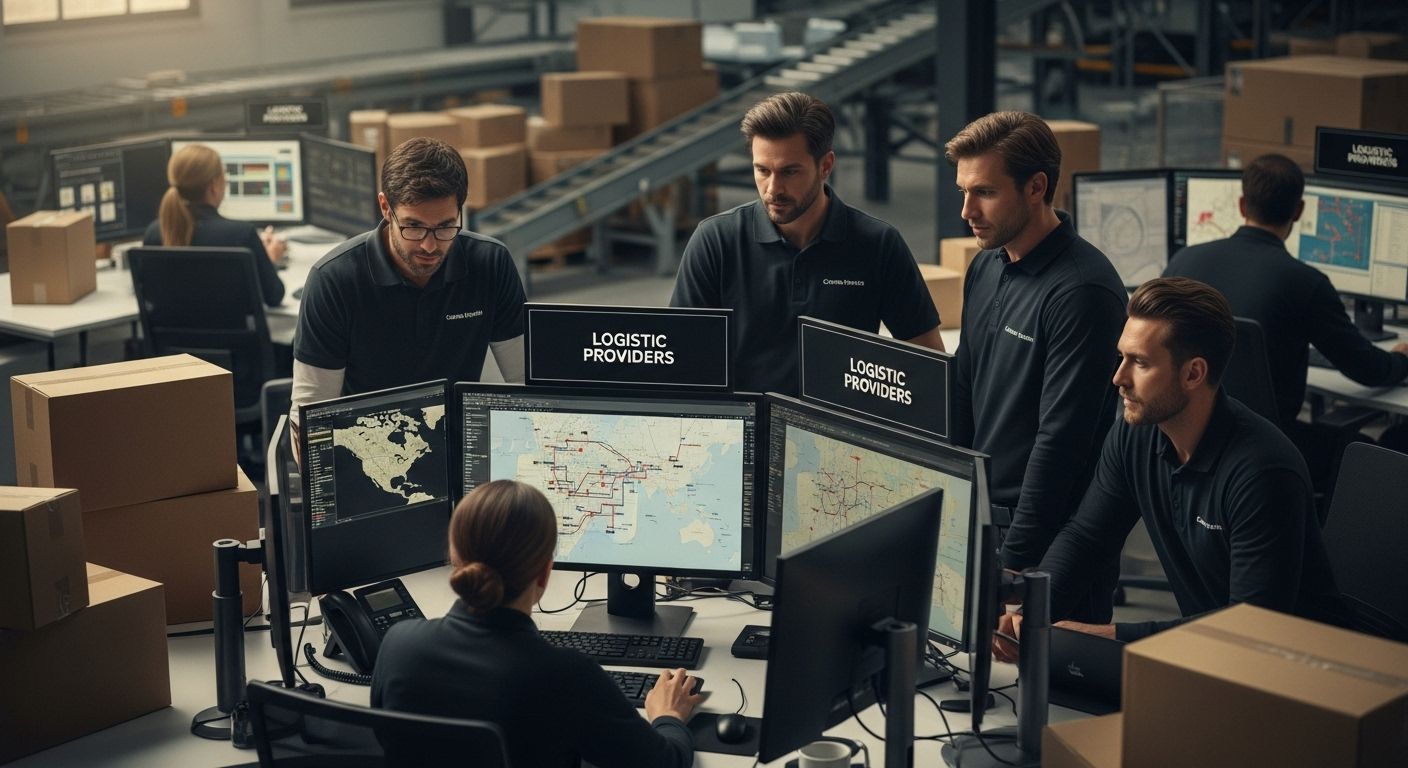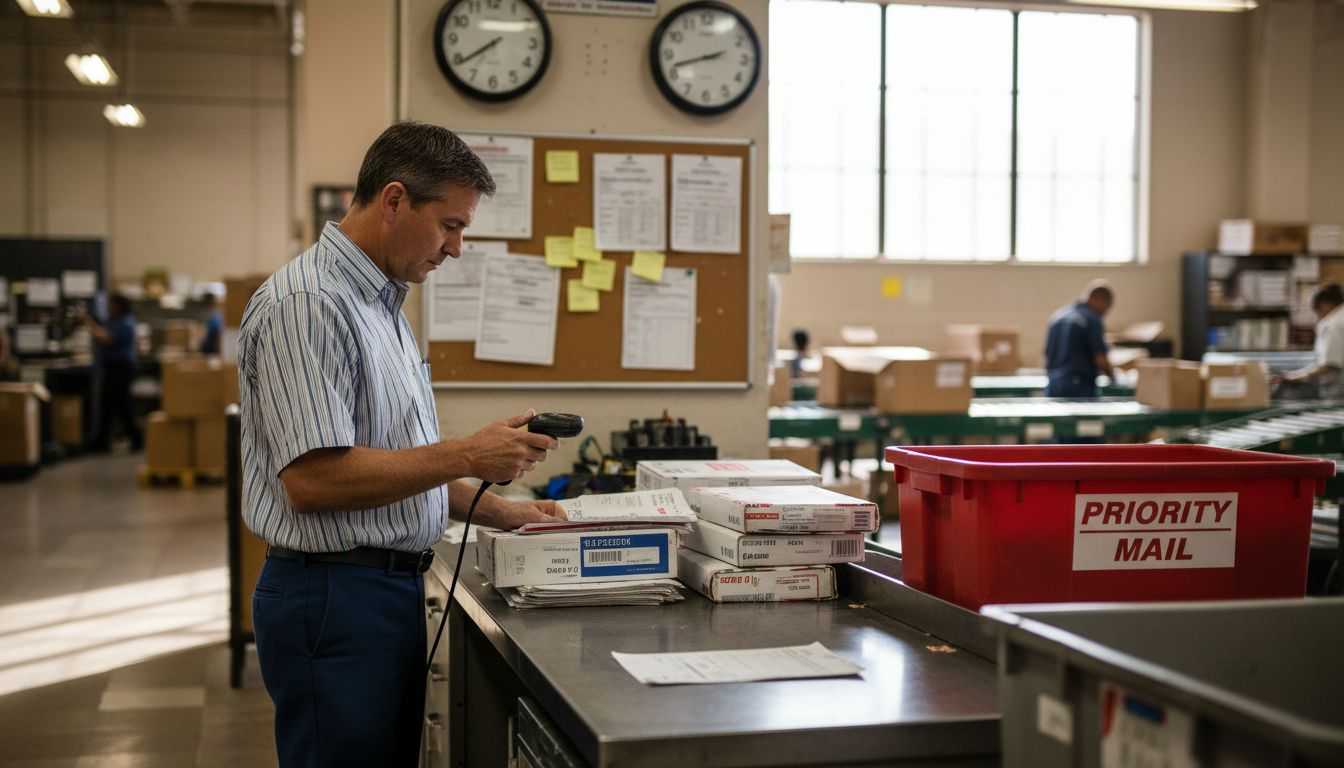Logistic providers keep global trade running smoothly, connecting industries from fashion to electronics in ways most people never see. Here is a number that might surprise you: logistics management accounts for over 8 percent of the world’s gross domestic product. Most people think logistics is just about shipping boxes from point A to point B. It is actually a full-scale operation with technology, strategy, and risk management at its core, shaping how products reach your door.
Table of Contents
- Defining Logistic Providers: What They Are And Their Role
- The Importance Of Logistic Providers In Global Trade
- How Logistic Providers Operate: Key Functions And Processes
- Essential Concepts In Logistics: From Freight To Customs
- The Future Of Logistic Providers: Trends And Innovations
Quick Summary
| Takeaway | Explanation |
|---|---|
| Logistic providers streamline shipping processes. | They manage transportation, warehousing, and inventory to enhance efficiency for businesses. |
| They ensure customs compliance for international trade. | Providers handle necessary documentation, tariffs, and regulations, reducing risks for companies. |
| Modern technologies enhance logistics operations. | Innovations like AI, IoT, and blockchain improve tracking, efficiency, and transparency in supply chains. |
| Sustainability is a growing focus in logistics. | Providers are adopting green strategies to reduce carbon footprints while enhancing operational performance. |
| Outsourcing logistics allows businesses to focus on core functions. | By leveraging logistics experts, companies can minimize operational complexity and cut costs. |
Defining Logistic Providers: What They Are and Their Role
Logistic providers are specialized companies that manage complex transportation and distribution processes for businesses across various industries. These organizations play a critical role in ensuring goods move efficiently from manufacturers to end consumers, handling intricate supply chain operations that would otherwise overwhelm individual companies.
Core Functions of Logistic Providers
At their fundamental level, logistic providers offer comprehensive services designed to streamline shipping and distribution processes. Their responsibilities extend far beyond simple transportation, encompassing a wide range of strategic activities:
- Warehousing and Inventory Management: Storing products safely, tracking inventory levels, and managing stock rotation
- Transportation Planning: Selecting optimal shipping routes, modes of transport, and managing multimodal logistics
- Customs Compliance: Handling documentation, tariffs, and international shipping regulations
Strategic Value in Global Trade
Logistic providers transform complex global supply chains into seamless networks. According to research from Ball State University, logistics ensures products reach consumers efficiently by managing the movement of goods through intricate transportation and distribution systems.
Businesses rely on these providers to reduce operational complexity, minimize shipping costs, and maintain competitive advantage. By outsourcing logistics functions, companies can focus on core business activities while leveraging the specialized expertise of professional shipping solutions.
The strategic importance of logistic providers cannot be overstated. They enable businesses to expand market reach, optimize supply chain performance, and respond quickly to changing market demands. From small local enterprises to multinational corporations, organizations across sectors depend on these specialized service providers to maintain smooth, efficient operations in an increasingly interconnected global marketplace.
The Importance of Logistic Providers in Global Trade
In the complex landscape of international commerce, logistic providers serve as essential architects of global trade infrastructure. Their strategic role extends far beyond simple transportation, enabling businesses to navigate intricate international markets with precision and efficiency.
Economic Impact and Global Connectivity
Logistic providers are critical drivers of economic growth, facilitating trade across diverse geographical regions. Research from the World Trade Organization highlights how these organizations create seamless connections between manufacturers, distributors, and consumers worldwide.
Their significance can be measured through several key economic contributions:
- Trade Volume Expansion: Enabling businesses to reach international markets more effectively
- Cost Reduction: Optimizing transportation and distribution processes
- Supply Chain Resilience: Creating flexible logistics networks that adapt to global challenges
Strategic Risk Management in International Trade
Modern logistic providers do more than move goods. They act as sophisticated risk management partners for businesses engaging in complex international transactions. By understanding regulatory environments, managing customs documentation, and navigating potential disruptions, these providers help companies mitigate potential financial and operational risks.
Businesses can explore detailed insights into global shipping strategies to better comprehend the intricate world of international logistics.
The global trade ecosystem relies on these specialized providers to maintain smooth, efficient operations. From managing intricate shipping routes to ensuring compliance with international regulations, logistic providers transform potential complexity into streamlined, manageable processes. Their expertise allows businesses of all sizes to confidently expand their market reach, reduce operational costs, and compete effectively in an increasingly interconnected global marketplace.
The following table compares traditional logistics approaches with modern logistics providers, highlighting key differences in processes and strategic value.
| Aspect | Traditional Approach | Modern Logistic Provider |
|---|---|---|
| Focus | Basic transportation and delivery | Comprehensive supply chain management |
| Technology Use | Manual processes, limited automation | Advanced digital platforms, automation |
| Risk Management | Reactive | Proactive, strategic planning |
| Customs Compliance | Basic documentation | Comprehensive regulatory and documentation expertise |
| Sustainability Efforts | Limited | Active adoption of green strategies |
| Market Reach | Often local/regional | Global, enables international expansion |

How Logistic Providers Operate: Key Functions and Processes
Logistic providers function as sophisticated orchestrators of complex transportation and distribution systems, employing advanced technologies and strategic methodologies to ensure seamless movement of goods across global networks.
Core Operational Mechanisms
The operational framework of logistic providers involves intricate processes designed to optimize efficiency and reliability. According to research from American Public University, these processes encompass several critical functional domains:
- Transportation Management: Planning and executing optimal shipping routes
- Inventory Control: Tracking and managing product quantities and locations
- Order Processing: Coordinating shipment details and customer requirements
- Warehousing: Storing and managing goods with precision and security
Technology and Infrastructure Integration
Modern logistic providers leverage cutting-edge technologies to transform traditional transportation models. Digital platforms enable real-time tracking, predictive analytics, and automated routing systems that dramatically enhance operational transparency and efficiency.
Businesses can gain comprehensive insights into shipping infrastructure to understand the complex mechanisms behind global logistics networks.
These providers utilize sophisticated software systems that integrate multiple data streams, allowing for dynamic route optimization, risk assessment, and performance monitoring. By combining human expertise with advanced technological solutions, logistic providers create resilient, adaptable systems capable of navigating the most challenging global trade environments. Their comprehensive approach ensures that goods move efficiently, cost-effectively, and with minimal disruption across international boundaries.
This table outlines essential logistics functions and their corresponding descriptions to clarify the roles logistic providers play in supply chain management.
| Logistics Function | Description |
|---|---|
| Warehousing | Safe storage of products, inventory tracking, stock rotation |
| Transportation Planning | Route selection, mode optimization, multimodal logistics |
| Customs Compliance | Handling documentation, tariffs, international regulations |
| Inventory Control | Monitoring product quantities and locations |
| Order Processing | Coordinating shipment details and customer requirements |
| Freight Management | Strategic coordination of goods across various transportation modes |
| Risk Management | Managing disruptions, ensuring compliance and continuity |

Essential Concepts in Logistics: From Freight to Customs
Logistics involves a complex ecosystem of interconnected processes that transform raw transportation challenges into seamless global trade solutions. Understanding the fundamental concepts is crucial for businesses navigating international shipping and trade regulations.
Freight Management Fundamentals
Freight management represents the strategic coordination of goods transportation across various modes including air, sea, rail, and truck. Research from U.S. Customs and Border Protection highlights the intricate nature of moving goods across international boundaries.
Key freight management considerations include:
- Transportation Mode Selection: Choosing the most efficient and cost-effective shipping method
- Cargo Packaging: Ensuring goods are properly secured and protected during transit
- Load Optimization: Maximizing cargo space and minimizing transportation costs
Customs Compliance and Documentation
Customs procedures form a critical component of international logistics, requiring meticulous attention to regulatory requirements. Businesses must navigate complex documentation processes that involve multiple governmental agencies and international trade regulations.
Companies can explore comprehensive freight forwarding strategies to better understand these intricate processes.
Successful logistics operations demand a holistic approach that integrates detailed documentation, regulatory compliance, and strategic transportation planning. From obtaining necessary import/export permits to managing tariffs and ensuring proper cargo classification, logistic providers play a pivotal role in simplifying these complex procedural requirements. Their expertise transforms potential bureaucratic obstacles into streamlined, efficient global trade processes.
The Future of Logistic Providers: Trends and Innovations
The logistics industry stands on the cusp of a technological revolution, with emerging innovations promising to fundamentally transform how goods are transported, tracked, and managed across global networks.
Technological Transformation in Logistics
According to research from the University of Cumberland, several groundbreaking technologies are reshaping the logistics landscape. These innovations are not merely incremental improvements but represent fundamental shifts in how logistic providers conceptualize and execute transportation and supply chain management.
Key technological trends include:
- Artificial Intelligence and Machine Learning: Enabling predictive analytics and intelligent routing
- Internet of Things (IoT): Providing real-time tracking and monitoring capabilities
- Blockchain Technology: Enhancing transparency and security in global trade transactions
Sustainability and Operational Efficiency
Modern logistic providers are increasingly focused on developing environmentally sustainable and operationally efficient solutions. This shift goes beyond traditional cost-cutting measures, encompassing a holistic approach to reducing carbon footprints and implementing green logistics strategies.
Businesses interested in cutting-edge logistics can explore advanced shipping strategies to stay ahead of emerging industry trends.
The future of logistics is characterized by a symbiosis of human expertise and technological innovation. Autonomous mobile robots, advanced predictive analytics, and integrated digital platforms are transforming traditional logistics models. These technologies promise not just incremental improvements, but a complete reimagining of how goods move across global supply chains, offering unprecedented levels of efficiency, transparency, and reliability.
Unlock Seamless Global Logistics for Your Business
If you have ever felt overwhelmed by complex shipping routes, customs regulations, or the challenge of keeping your supply chain running smoothly across borders, you are not alone. Many businesses experience these same hurdles as described in our article on key logistics concepts. Navigating warehousing, freight management, documentation, and real-time tracking can feel daunting when the stakes are high and your customers are relying on timely, safe deliveries. That is where making the right partnership truly matters. Discover how Worldwide Express, Inc. transforms these obstacles into straightforward, manageable solutions.

Empower your supply chain with expert support that delivers confidence and clarity. Visit Worldwide Express, Inc. today to explore our full range of logistics services including import/export freight forwarding, air and ocean transportation, and comprehensive customs brokerage. For more industry-specific insights, see our Uncategorized section. Take the next step now and simplify your international shipping for lasting success.
Frequently Asked Questions
What are logistic providers?
Logistic providers are specialized companies that manage transportation and distribution processes for businesses, ensuring efficient movement of goods from manufacturers to consumers.
What services do logistic providers offer?
Logistic providers offer a range of services, including warehousing and inventory management, transportation planning, customs compliance, and strategic risk management in international trade.
How do logistic providers enhance supply chain efficiency?
Logistic providers optimize supply chain performance by minimizing operational complexity, reducing shipping costs, and enabling businesses to respond quickly to market changes.
What role do technology and innovation play in logistics?
Technology and innovation are crucial in logistics, with advancements like AI, IoT, and blockchain enhancing operational efficiency, real-time tracking, and overall transparency in global trade.






